Implementing lean manufacturing can be challenging for many companies, and there are several reasons why they may fail in their efforts:
1. Lack of Leadership Commitment: One of the primary reasons for failure is the lack of strong leadership commitment and support. Lean manufacturing requires a cultural shift within the organization, and without top-level support and involvement, it can be difficult to sustain the changes needed for success.
2. Inadequate Training and Skill Development: Implementing lean manufacturing requires employees at all levels to have a good understanding of lean principles and tools. If employees are not adequately trained or do not have the necessary skills to implement lean practices, the initiative is likely to fail.
3. Resistance to Change: Resistance to change is a common barrier to successful lean implementation. Employees may be resistant to new ways of working or may feel threatened by the changes that lean manufacturing brings. Overcoming this resistance requires effective change management strategies.
4. Poor Communication: Effective communication is crucial during the implementation of lean manufacturing. If there is a lack of clear communication about the goals, progress, and benefits of lean practices, employees may not fully understand or buy into the changes.
5. Inconsistent Implementation: Inconsistency in implementing lean practices can lead to confusion and inefficiencies. It is important for companies to have a clear plan for implementing lean manufacturing and to ensure that practices are consistently applied across the organization.
6. Short-Term Focus: Some companies may focus too much on short-term cost savings and overlook the long-term benefits of lean manufacturing, such as improved quality, productivity, and customer satisfaction. It is important to have a long-term perspective when implementing lean practices.
7. Lack of Continuous Improvement: Lean manufacturing is based on the concept of continuous improvement. Companies that fail to foster a culture of continuous improvement and learning are less likely to see sustained benefits from their lean initiatives.
8. Failure to Align with Business Objectives: Lean manufacturing initiatives should be aligned with the overall business objectives of the organization. If there is a disconnect between lean practices and the company’s strategic goals, the initiative is less likely to succeed.
9. Overemphasis on Tools: Some companies focus too much on implementing lean tools and techniques without fully understanding the underlying principles. It is important to have a holistic understanding of lean manufacturing and not just rely on tools for success.
10. Lack of Patience: Implementing lean manufacturing takes time and patience. Companies that expect to see immediate results may become discouraged and abandon the initiative before it has had a chance to fully take root and deliver benefits.
By addressing these common challenges and barriers, companies can increase their chances of successfully implementing lean manufacturing practices and realizing the benefits of improved efficiency, quality, and competitiveness.



